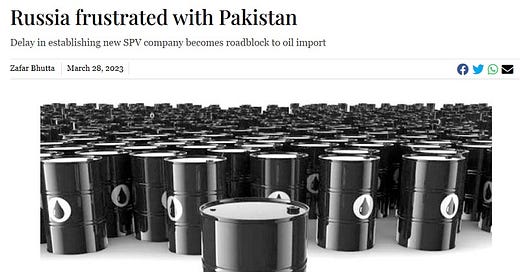Pakistan’s Delay In Importing Russian Oil Coincides With Reports About Islamabad Arming Kiev
While Russia is keeping its energy-related ties with Pakistan separate from whatever growing differences they might have behind the scenes over Ukraine, its non-traditional South Asian partner is unofficially linking the two, likely due to the US’ influence.
The Express Tribune published a piece on Tuesday titled “Russia frustrated with Pakistan”. It was subtitled “Delay in establishing new SPV company becomes roadblock to oil import”, which is purportedly the reason behind the latest troubles in their ties. According to them, “Pakistan had agreed to import one cargo of crude oil from Russia next month, but due to the delay in setting up the [Special Purpose Vehicle], the first shipment was now expected to arrive in May.”
At present, the SPV has yet to be established: “Islamabad, however, had not yet started work on this plan and had not registered the SPV, which irritated Moscow.” The game-changing Russian-Pakistani energy deal that was agreed to during its Foreign Minister’s trip to Moscow in late January, which was supposed to result in the former becoming the latter’s second-largest oil supplier behind Saudi Arabia, therefore can’t be taken for granted since there isn’t any guarantee that it’ll happen.
To make matters all the more alarming, Pakistan’s unexpected delay in setting up its SPV for purchasing Russian oil per their prior agreement coincides with reports about Islamabad arming Kiev. It was assessed in early March that there’s likely some credence to these reports since that country’s fascist post-modern coup regime has an interest in doing its Anglo-American patrons’ bidding. This past weekend, images also emerged purporting to show Kiev firing Pakistani rockets at Russian troops.
Around the same time, the New York Times candidly reported on a US mercenary’s plot to purchase passports from “corrupt” Pakistan as he described it in order to facilitate the travel of Afghan fighters to Ukraine. These three sequential developments very strongly suggest that the country’s fascist post-modern coup regime has tacitly recalibrated its stance towards the Ukrainian Conflict in favor of the US’ proxies there despite still abstaining from UN votes against Russia.
This observation implies that while Russia is keeping its energy-related ties with Pakistan separate from whatever growing differences they might have behind the scenes over Ukraine, its non-traditional South Asian partner is unofficially linking the two, likely due to the US’ influence. Russia remains interested in becoming Pakistan’s second-largest oil supplier, but that recipient state now appears to be reconsidering whether it still wants that to happen, which raises questions about the future of their ties.




